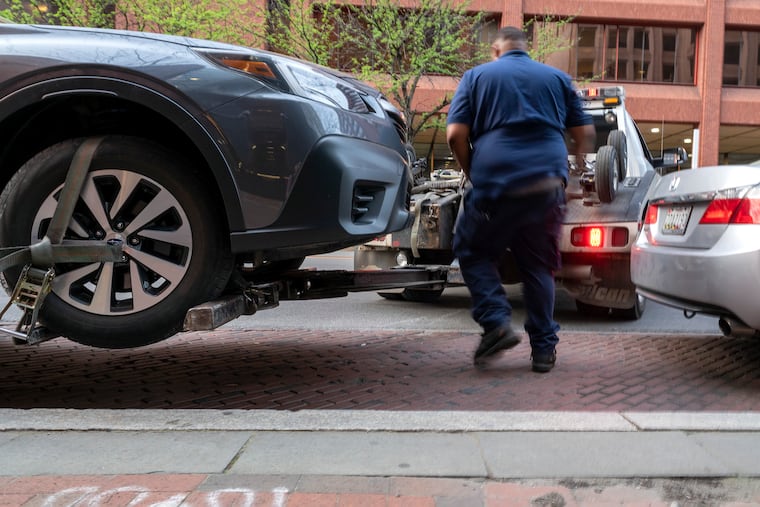‘Courtesy tow’ tracking software could bring some relief for Philly drivers. Maybe.
Mayor Parker has proposed $225K for software to let police track courtesy tows. It's a positive step, but private tow companies seem to be the worst offenders.

How much courtesy will a quarter-million dollars buy you in Philadelphia these days?
That depends on who took your car.
Tucked into Mayor Cherelle L. Parker’s $6.29 billion budget proposal is $225,000 for new police software to make courtesy towing more … courteous.
Meaning that if your vehicle disappears one morning, you just go online and find out where it is.
Maybe. It’s a little complicated. We’ll explain.
Philly drivers have been complaining about so-called courtesy towing — formally known as “relocation towing” — for as long as anyone can remember. Possibly since horses were phased out.
It occurs when the police department, the Philadelphia Parking Authority, or private tow companies move cars from legal parking spaces that have become temporary no-parking zones due to construction, utility work, or special events.
Example: If you park in your regular spot on Monday and the temporary no-parking signs go up Tuesday, your car could be gone when you go to drive it on Friday.
Vehicles can be dropped off around the block, or in another neighborhood altogether. Some drivers find their cars in minutes, others months later. Police may or may not have any useful information about your car’s whereabouts. Many cars are reported stolen, then later recovered. A handful of courtesy-tow victims have never seen their cars again.
» READ MORE: Did you get a courtesy tow in Philly? Here’s what to do.
The Inquirer has been documenting the problem for five years. Two potential class-action lawsuits have been filed in federal court. The city had previously done little to address the issue.
The spending in Parker’s proposed budget, if approved by City Council, would create a searchable database for tracking cars that are towed by the police department. The PPA implemented such a system in 2020 that covers the cars that it relocates.
Lt. Michael Anderson, head of the Police Department’s Tow Squad, said that, ideally, towing companies that have contracts with the city would also be part of the program. All the information would be on one site.
“You’d be able to find it just by going to the website,” Anderson said Tuesday. “My thought was it needed to be one-stop shopping.”
There’s a loophole here, though: The system likely would not include all the private tow companies that are brought in by third parties, such as the construction crews that need curb space. They’re supposed to relay the new vehicle locations to police.
“Does that always get done?” Anderson asked. “I’m going to say no.”
Of the proposed tracking software, Anderson said: “I think this could solve the issue for anything the city is responsible for. But if Joe Smith’s Plumbing hires Jim Bob’s Towing, it’s not going to solve that problem.”
» READ MORE: ‘Nobody is safe’: Philly officials refuse to fix courtesy-tow problem as class-action lawsuits proceed
Unfortunately for Philly drivers, a Jim Bob is indeed at the center of many of the worst courtesy-tow cases.
In early 2021, for instance, Gary Isaacs, while away on vacation, had his car towed from his regular space in Center City, within the on-street area covered by his parking permit. It was dropped off in a loading zone. Then, the PPA came along and ticketed it, impounded it, and started to put it up for auction.
Isaacs had to pay nearly $1,000 in fines and fees to get his car back. It turns out that a resident on the block had obtained a temporary no-parking sign from the city to get a tree removed. City officials gave him conflicting information about moving Isaacs’ car, then eventually told him to call a tow company to have it take the vehicle away.
Isaacs said he’s amazed that the city still gives tow companies the power to take cars and drop them off wherever they please.
He said: “It’s like you’re looking for a lost dog or something — just walking around looking for your car.”
And if cars are towed to illegal parking spaces and ticketed, there is often no documentation that the owners can show the PPA to dispute the tickets. Isaacs was initially unsuccessful in his appeal. He was able to recoup most of his money months later, after The Inquirer story ran.
“I think they were just feeling the heat,” he said.
PPA spokesperson Marty O’Rourke said this week that there have been no changes to the system that would enable the parking authority to identify cars such as Isaacs’ that are towed into illegal spaces.
“Under the current system,” O’Rourke said, “a PPA enforcement officer would have no way of knowing that a car that has been relocated by a private tower is a courtesy tow.”
In 2022, the city paid $15,000 each to two courtesy-tow victims in an attempt to resolve one of the lawsuits. But 17 plaintiffs remain among two open suits.
The plaintiffs include a nurse whose Nissan Maxima racked up $808 in tickets after it was courtesy-towed to a metered spot; a lawyer who was pulled over in New Jersey and handcuffed for driving her own car because it remained in a stolen-vehicle database after a courtesy tow; and a man whose car was towed a second time in the 15 minutes it took him to respond to the scene after police found it following a courtesy tow the week before.
The lawsuits seek class-action status on behalf of possibly thousands of victims.